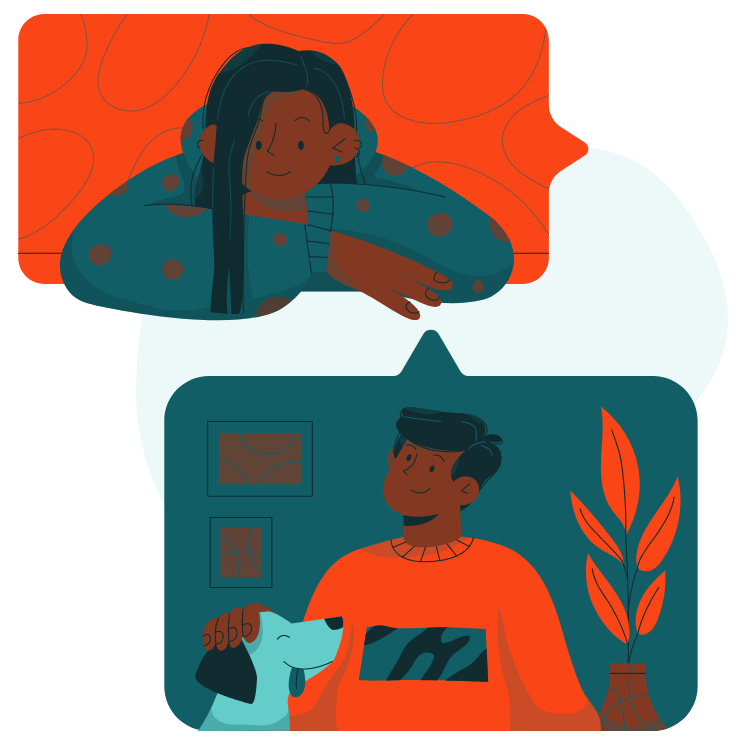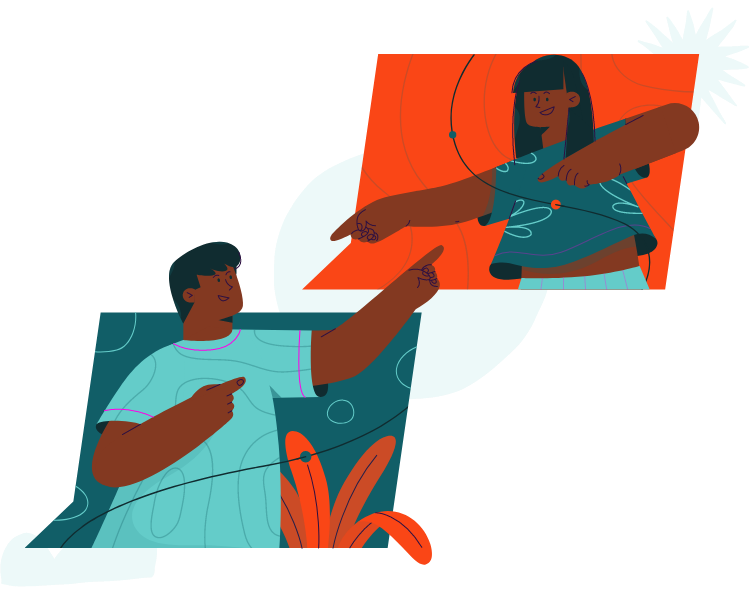Digital Spaces: Sexual Assault Awareness Month 2021

Building Respectful & Affirming Digital Spaces
Sexual Assault Awareness Month 2021
 Every April is Sexual Assault Awareness Month (SAAM), a nation-wide effort to raise awareness of sexual assault and an opportunity to share sexual assault prevention strategies. Taking our cue from the National Sexual Violence Resource Center and its 2021 focus on "Building Safe Online Spaces," YWCA Utah will be working to build respectful and affirming digital spaces by encouraging action against online hate, harassment, and abuse. Throughout April, we will be highlighting ways you can take indirect and direct actions. If you or someone you know is experiencing hate, harassment, or abuse online, community resources are available. If you fear for your safety or are seeking services such as a protective order or SANE exam, help is available through the Salt Lake Area Family Justice Center at the YWCA.
Every April is Sexual Assault Awareness Month (SAAM), a nation-wide effort to raise awareness of sexual assault and an opportunity to share sexual assault prevention strategies. Taking our cue from the National Sexual Violence Resource Center and its 2021 focus on "Building Safe Online Spaces," YWCA Utah will be working to build respectful and affirming digital spaces by encouraging action against online hate, harassment, and abuse. Throughout April, we will be highlighting ways you can take indirect and direct actions. If you or someone you know is experiencing hate, harassment, or abuse online, community resources are available. If you fear for your safety or are seeking services such as a protective order or SANE exam, help is available through the Salt Lake Area Family Justice Center at the YWCA.
 Developing shared understandings of online hate, harassment, and abuse.
Developing shared understandings of online hate, harassment, and abuse.
With so many of our interactions relegated to digital spaces during the coronavirus pandemic, it is more pressing than ever to take action against online hate, harassment, and abuse. These forms of harm occur in digital spaces and can be broadly defined as the "pervasive or severe targeting of an individual or group online through harmful behavior" (Pen America Online Harassment Field Manual). The online abuse wheel illustrates the connections between online harassment and abuse and gender-based violence. It portrays the tactics used to inflict harm, the associated legal issues, and the impact on those who are victimized. Tactics may include cyberbullying, cyberstalking, hate speech, online sexual harassment, and threats of physical or sexual violence, among others. For a more comprehensive list of tactics and their descriptions, check out Pen America's "Glossary of Terms." According to Feminist Frequency, the first three steps a person can take to protect themselves against online hate, harassment, and abuse are:
- Set up two-step verification.
- Create unique and complex passwords.
- Remove potential doxing information (such as a home address, email, phone number, social security number, photos).
Check out Feminist Frequency's Guide to Protecting Yourself from Online Harassment for more in-depth prevention measures. With or without these protective measures, when online hate, harassment, or abuse is perpetrated, it always the fault of the individual who chooses to perpetrate the harm, never the fault of the individual being victimized.
 Creating online safe spaces by understanding how consent translates to online interactions.
Creating online safe spaces by understanding how consent translates to online interactions.
Did you know that consent extends to online interactions? Simply put, consent is when someone gives permission or agrees for something to happen. Planned Parenthood developed the “FRIES” consent framework, emphasizing that consent must be freely given, reversible, informed, enthusiastic, and specific. Whether interacting with someone in-person or through screens, it is necessary to respect the boundaries of others and to establish consent. Some examples of practicing consent online include:
- Asking permission each time before sending explicit messages or texts.
- Finding out if a person is okay with you posting a photo of them on social media.
- Maintaining the privacy of a person if they send you a photo of themselves.
- Honoring a person's private property by asking for permission to look at their phone.
During Sexual Assault Awareness Month and beyond, consider how you can practice consent and respect in online interactions. Check out the National Sexual Violence Resource Center for more information on digital consent! April 6th is the Day of Action during Sexual Assault Awareness Month! Practicing consent is one way to take action. Some ways to practice consent today include discussing online boundaries with a partner, asking if a friend would rather receive a phone call than a video call, or communicating with coworkers about expected timeframes for returning work-related messages. Expand your impact even more by helping others learn about digital consent!
 Taking action against online hate, harassment, and abuse.
Taking action against online hate, harassment, and abuse.
An "actionist" is a person who takes action in the moment to prevent or interrupt harm or who supports a survivor after witnessing hate, harassment, or abuse (Rothman et al., 2019). The most important step is to ask the individual being targeted what forms of support they would appreciate. Hollaback! has also developed a series of indirect and direct strategies for taking action against all forms of harassment, known as The Five D's:
- DISTRACT: find a way to derail the exchange by interrupting it. For example, you could post a series of funny cat memes on the thread to draw attention away from the person perpetrating harm.
- DELEGATE: rally others to your cause by alerting supportive individuals and online communities to the harassment. Let them know what platform the harm is occurring on and respond in large numbers by amplifying the content of the person being victimized, by derailing the exchange, or by reporting the abuse to the platform.
- DOCUMENT: support a targeted person by documenting online hate, harassment, and abuse by taking screenshots and saving hyperlinks. Approach the person experiencing harm (provide a trigger warning so they will not be retraumatized) and ask how they would like to use the documentation you have collected.
- DELAY: check in with the person being abused. Offer to listen, validate their experiences, reiterate that the abusive behavior is not okay or their fault, share resources, or offer specific support strategies and let them choose how to be supported.
- DIRECT: name what is happening or directly confront the person perpetrating hate, harassment, or abuse online. If you are considering this method, first consider your own safety, and try to check in with the person being targeted. Tactics can include intervening with comments made in support of the targeted person, condemning the harassment, publishing a solidarity statement, or fact-checking false claims.
For a more detailed explanation of the actions that can be taken against online hate, harassment, and abuse, check out Pen America's Online Harassment Field Manual: Best Practices for Allies and Bystanders). Becoming an actionist takes practice. It is one thing to be aware of possible online intervention strategies and quite another to be skilled at putting them into action. Fortunately, Hollaback! offers a range of free trainings aimed at ending all forms of harassment, including a one-hour workshop on How to be an Ally When You Witness Online Abuse. Another option is to join Heartmob, a platform developed by Hollaback! that allows members to report and document harassment, request support from other members and take action to end online harassment. Access these trainings and platforms to grow your online actionist skills!
 Building respectful & affirming digital communities.
Building respectful & affirming digital communities.
Participating in respectful digital communities has become even more critical during the coronavirus pandemic. Pen America suggests the following tips for finding supportive online communities:
- Locate your people. Perhaps you are already a member of different Facebook groups or online forums.
- Talk to the group about online harassment before it happens.
- Create a separate place where members of your community can be easily reached if online harassment begins.
- Give back to your online community by supporting others facing harassment.
Today, consider locating your community, joining new online groups, or starting a group conversation about preventing online harassment. (Information for finding supportive cyber communities came from the Pen America Online Harassment Field Manual) Respectful and affirming online spaces are those that promote healing, peace, and non-judgment rather than guilt or shame. Where have you found a safe and affirming online community? Give that person, page, or platform a shout out here or in your stories! Here are a few of our favorites: The Trevor Project (@trevorproject), The Rape Recovery Center (@raperecoverycenter), The U of U Counseling Center (@uofucounseling), and Trauma Aware Care (@traumaawarecare).
 Strategies for self-care, showing support to others, and enacting solidarity in the aftermath of online hate, harassment, or abuse.
Strategies for self-care, showing support to others, and enacting solidarity in the aftermath of online hate, harassment, or abuse.
In the aftermath of online hate, harassment, and abuse, it is vital that we take care of ourselves in ways that meet our own unique needs. When considering what this routine may look like for us, we can refer to Heartmob's Self-Care Guide to Healing from Online Harassment. It is filled with helpful advice and resources, such as help-seeking strategies, steps for regaining a sense of control in a situation, options for safely speaking out about your experiences, and strategies for checking in with your emotions and boosting positive feelings about yourself. One meaningful way to show support and solidarity to a person who has been victimized online is by connecting them to resources that will validate their experience and assist them in navigating the incident. Some of our favorite resources include:
- Cyber Civil Rights Initiative Helpline: counselors and victim support specialists available 24/7 to provide emotional support, technical advice, and information to individuals experiencing online abuse, with a focus on nonconsensual pornography (or, “revenge porn”). Accessible by calling 844-878-CCRI.
- SafeUT Crisis Chat and Tip Line: licensed clinicians available 24/7 to support young people experiencing emotional crises, bullying, relationship problems, mental health, or suicidal ideation in the form of crisis counseling, suicide prevention, and referrals. Accessible via the SafeUT app or by calling 833-372-3388 (833-3SAFEUT).
- National Sexual Assault Hotline: trained support specialists available to provide information, confidential support, and referrals. Call 800.656.HOPE to be connected to a local service provider, access the online hotline 24/7, or seek supportive services via the RAINN mobile app.
- National Domestic Violence Hotline: trained advocates available 24/7 to provide support, crisis intervention, education, and referrals to survivors of domestic violence. Accessible by calling 1-800-799-SAFE (7233) or via live online chat.
- Love is Respect: trained advocates available 24/7 to provide information, support, and advocacy on romantic relationships to youth ages 13 to 26 via phone, text, or live online chat. Resources also made available to concerned friends, family members, teachers, counselors, and service providers. Get in touch by texting “LOVEIS” to 22522, calling 866-331-9474, or live chatting online.
Additional Resource Lists: 
Still have questions?
Reach out to our Prevention Program Manager, Jess Burnham, via email for more information on prevention strategies and how you can help.
